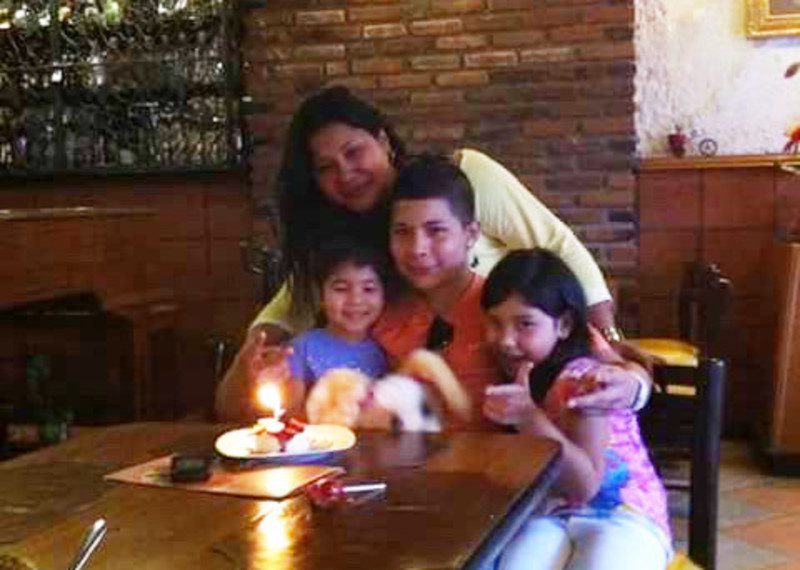When Tailyn Wang, a 34-year-old Peruvian woman living in Mexico City, was woken by a loud bang on her door in the early hours of the morning, she never imagined the horrific chain of events that would follow.
It was 4am on Friday 7 February 2014 when five federal police officers stormed into her house. The restaurant owner and mother of three was lying in bed with her husband, her children asleep in the next room.
“They ripped off my clothes. One of them forced himself on top of me in bed and started insulting me: ‘You whore, you fucking pig.’
“My husband screamed, ‘Don´t hit her, she is pregnant’ but they didn´t care,” Tailyn told me.
My husband screamed, ‘Don´t hit her, she is pregnant’ but they didn´t care
Tailyn Wang, torture survivor.
Amid screams of terror, the police took her and her husband away. There was no arrest warrant, nor any explanation. Tailyn describes how she was shoved into a van, the police officers beating her in the stomach as they drove her to an enormous underground parking lot surrounded by cells.
There, in the cells, the torture continued.
“They said they were going to come for my children. ‘You are going to cooperate you fucking bitch,’ they yelled. They touched me all over my intimate parts and said they were waiting for the other boys to come and rape me,” Tailyn said.
After three or four hours, she was taken to the Federal Attorney General´s office on Organized Crime (SEIDO), where they kept her for four days, between a cell and an office, while officials tried to force her to say she was involved in criminal activities.

While there, she was taken to a government doctor. Despite her injuries, she says the doctor refused to examine her, dismissing her claims that she’d been brutally beaten.
“No, no, they haven´t beaten you,” the doctor said.
Following her “interrogation”, Tailyn was taken to an office where she was told to sign some blank pages.
“I refused to sign – so the man threatened to hurt my children. I looked him in the eye and said, ‘My children are safe, God is with them.’ He responded: ‘After all of this, you believe in God?’”
Back in her cell, Tailyn, who was approximately seven weeks pregnant, began to bleed profusely.
“I saw big clots of blood. Then for some time I blacked out completely, I don´t know for how long. I kept bleeding and then while I was lying down on that metal bed, I saw the fetus come out in a pool of blood. Other detainees next to me began to scream. A government official came in to see what was going on. ´It´s all just a big show´, she said.”
I saw big clots of blood. Then for some time I blacked out completely, I don´t know for how long. I kept bleeding and then while I was lying down on that metal bed, I saw the fetus come out in a pool of blood. Other detainees next to me began to scream. A government official came in to see what was going on. ´It´s all just a big show´, she said.
Tailyn Wang.
But no one came to help. Instead, she was handed a few sheets of paper towel to shove down her pants before being handcuffed and whisked away to board a commercial plane heading for a federal prison. When the plane touched down in the city of Tepic, Northwest Mexico, the airline seat was drenched with blood. She told prison officials she had suffered a miscarriage – they yelled at her.
It was only then, in prison and days after her arrest, that she found out that she was being accused of being part of a gang of kidnappers and charged with organized crime. She bled for five more days in prison without being given any medical attention.
Tailyn told me her story under the scorching sun of the federal prison where she is being held. The place is famous for holding dozens of people who, just like her, were detained without reason.
Several women I spoke with in the federal prison in Tepic had also been tortured: beaten, asphyxiated, even raped, yet none of those who inflicted those horrors have faced justice.
Torture in Mexico is a virus of alarming proportions.
Several women I spoke with in the federal prison in Tepic had also been tortured: beaten, asphyxiated, even raped, yet none of those who inflicted those horrors have faced justice. Torture in Mexico is a virus of alarming proportions.
Madeleine Penman, Researcher on Mexico at Amnesty International.
Despite having more than 2,000 complaints of torture on file, federal authorities bring forward less than five charges to the courts each year.
Following Amnesty International’s campaigning and other Mexican human rights organizations’ advocacy efforts, Mexican President Enrique Peña Nieto has promised to put forward a bill to congress in coming weeks for a nationwide law on torture.
While this could undoubtedly be a step forward, unless there is a change in culture to tackle the prolific use of torture and other ill-treatment by the police and other security forces, it will be worthless for the thousands of victims in Mexico.
Over the last decade, Amnesty International has documented many cases, just like Tailyn´s, where official doctors simply disregard claims of torture and ill-treatment and fail to properly examine victims or take note of their injuries – crucial evidence if there is any hope of holding the perpetrators to account. And even when independent forensic experts investigate and find evidence of torture or other ill-treatment later on, Mexican authorities continue in their denial.
If the law does not tackle this ‘hear no, see no, speak no evil’ culture and improve the medical documentation of torture and other ill-treatment, then thousands of victims will continue to be overlooked with no hope for justice and reparation.
A good Torture Bill could change this, but only if it is fit for purpose. Anything less will only be meaningless words on paper.
As one victim of sexual torture told me: “I hear on the radio that there are reforms in Congress. What good are these to me? What benefit am I seeing?”
This article was first published in the International Business Times


